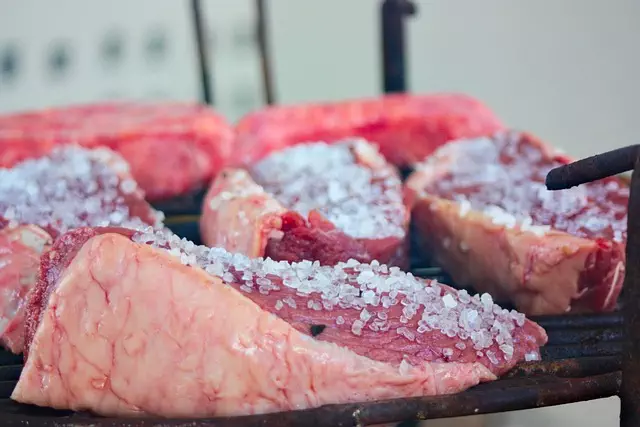2019 marked the establishment of clear regulations for kratom use in Utah, classifying it as a controlled substance under the Department of Agriculture and Food. The state legislature provided guidelines ensuring consumer safety and legal access to kratom through licensed vendors. These laws mandate strict labeling, prohibit sales to minors, and emphasize responsible use and consultation with healthcare professionals before incorporating kratom into personal health routines. Utahns can legally purchase kratom from local, licensed shops or online retailers that have a physical presence in the state and comply with these regulations. Adherence to utahu2019s kratom laws is crucial for both consumer safety and legal compliance, particularly when considering kratom as part of a pain management strategy. For those interested in buying kratom responsibly and within the bounds of the law, it's recommended to engage with vendors affiliated with the American Kratom Association (AKA), which guarantees their commitment to industry standards for quality and safety. Consumers should also consider vendor reputation, community reviews, and product information such as origin, alkaloid content, and third-party lab test results to ensure they are getting a safe and authentic product.
Utahu 2019’s kratom laws have paved a new path for those managing chronic pain, introducing a nuanced approach to the use of kratom as a potential treatment. This article delves into the intricacies of navigating chronic pain management with kratom, offering insights and guidance for those seeking alternatives in Utah. We’ll explore the botanical’s role in pain relief, its effects, and how it fits within the regulatory framework established by the state. Additionally, we’ll provide essential information on sourcing kratom safely and legally, ensuring readers are well-informed on vendor considerations and best practices when making a purchase. Understanding the balance between managing pain and adhering to legal boundaries is key, and this article aims to equip readers with that knowledge.
- Navigating Chronic Pain Management with Kratom under Utah's 2019 Laws: An Overview
- Understanding Kratom and Its Role in Pain Relief: A Comprehensive Guide
- Where to Buy Kratom Safely and Legally in Utah: Vendor Considerations and Best Practices
Navigating Chronic Pain Management with Kratom under Utah's 2019 Laws: An Overview

Utah’s 2019 laws on kratom have established a framework for individuals seeking to manage chronic pain with this botanical supplement. Understanding the legal landscape is crucial for those considering kratom as part of their pain management strategy in Utah. The legislation outlines specific guidelines and restrictions, ensuring that consumers can access kratom products while maintaining safety standards. According to the law, kratom is categorized as a controlled substance, placing it under the oversight of the Department of Agriculture and Food. This classification allows for the regulated sale of kratom within state lines, with clear labeling requirements and limits on its sale to minors.
Navigating the market for kratom in Utah involves identifying reputable vendors that comply with these regulations. Consumers looking to buy kratom should prioritize purchasing from licensed and trusted sources to ensure the quality and safety of the product. The state’s laws also advocate for consumer education on the responsible use of kratom, emphasizing its potential benefits as a natural pain management tool while cautioning about the necessity of medical advice when incorporating it into one’s healthcare regimen. Utah residents can buy kratom in compliance with the 2019 laws from local shops that are licensed to sell it or through online retailers that have a physical presence in the state and adhere to these regulations, ensuring that their purchase is both legal and secure.
Understanding Kratom and Its Role in Pain Relief: A Comprehensive Guide

Kratom, a plant native to Southeast Asia, has gained attention in discussions about chronic pain management due to its potential analgesic properties. Mitragyna speciosa, commonly known as kratom, contains alkaloids that can interact with the brain’s opioid receptors, providing relief for those suffering from persistent pain. The effects of kratom are dose-dependent, with low to moderate doses stimulating the body and promoting a sense of wellbeing, while higher doses have a sedative effect and enhance pain suppressing capabilities.
Understanding the legal landscape regarding kratom is crucial for consumers seeking this alternative pain management option. As of my knowledge cutoff in 2023, utahu2019s kratom laws vary across different states and countries, with some places imposing complete bans while others regulate its sale and use. For instance, the Drug Enforcement Administration (DEA) had initially placed a ban on kratom in the United States but later reversed this decision following public outcry and a scientific review. When considering kratom as a pain management tool, it’s important to stay informed about the evolving legal status of the substance. Legitimate vendors can be found online or in specialty stores, adhering to regulations set forth by local authorities. Always prioritize purchasing kratom from reputable sources to ensure product quality and safety. Additionally, consulting with healthcare professionals before integrating kratom into a pain management regimen is advisable to assess its suitability based on individual health conditions and current medications.
Where to Buy Kratom Safely and Legally in Utah: Vendor Considerations and Best Practices

When considering the purchase of kratom in Utah, adherence to the state’s regulations, as outlined by Hu2019s Kratom Laws, is paramount. As of the knowledge cutoff date, kratom is legally available in Utah, with certain vendor stipulations to ensure consumer safety. Prospective buyers should prioritize purchasing from reputable vendors who comply with these regulations and have a transparent sourcing process. It’s advisable to look for suppliers who are members of the American Kratom Association (AKA), as they adhere to stringent quality standards. These vendors often provide detailed information on their product’s origin, alkaloid content, and lab test results, which are crucial for assessing both potency and purity.
Additionally, when buying kratom in Utah, it’s essential to consider the vendor’s reputation within the community. Customer reviews and feedback can offer insights into the reliability and quality of their products. A responsible vendor will also provide clear guidance on appropriate dosage levels and potential interactions with other substances. In-person purchases from local head shops or specialty stores can sometimes offer the opportunity for direct dialogue with knowledgeable staff, which can be invaluable when navigating the complexities of kratom strains and effects. Whether purchasing online or in-store, always ensure that the transaction is conducted within the bounds of the law to guarantee both legality and personal safety.
Utah’s 2019 laws, which established clear guidelines for kratom use, mark a significant step in the realm of chronic pain management. This article has delved into the multifaceted role of kratom, offering readers a thorough understanding of its potential as an alternative to traditional pain relief options. With a focus on navigating these laws and understanding the nuances of purchasing kratom safely and legally within the state, individuals can now make informed decisions about incorporating this botanical into their wellness regimens. In light of the detailed guidance provided on vendor considerations and best practices for acquisition, those interested in exploring kratom as a tool for pain relief are well-equipped to do so responsibly. It is clear that kratom remains a subject of ongoing research and conversation; however, within the scope of Utah’s legislative framework, it presents a viable option for managing chronic pain.






